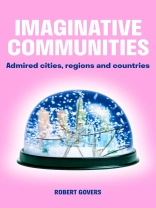Americans are loud. Amsterdam equals sex, drugs, and rock & roll. Mexicans are lazy and Germans are boring, but punctual. Paris is romantic, Wuhan infectious, Ukrainians heroic, and New Zealand untouched.
This is the way people around the world think about cities, regions and countries and the communities that live there; through cliches and stereotypes. It can be frustrating and hindering trade, diplomacy, investment, tourism, or talent attraction. Many believe that such image problems can be resolved with advertising campaigns, but the classic tourism promotion model is broken and insufficient. This book explains what works and what doesn’t when it comes to improving the reputation of cities, regions, and countries. It does so without the use of jargon and with reference to numerous case-studies. The book primarily aims to inspire readers and offer them a broad overview of an issue in modern society that is of interest and relevance to all of us: the reputation of our communities.
New cover (by Arjen IJff, 2022), same book (2018)!
’This book will thrill leaders, planners, globalists, policy makers and sociologists with practical steps for implementing creative ideas that will invigorate community spirit and build reputation’. Booklife Reviews
’IMAGINATIVE COMMUNITIES: Admired Cities, Regions and Countries by Robert Govers is a feat of informative facts and fancies to set the imagination soaring… making it quite the timely read as civilization heads into the year 2020 and beyond’. With a rating of 4.2 (of 5) the book is Indie Reader Approved.
’IMAGINATIVE COMMUNITIES is chock full of facts, charts, and information that can help guide local communities to a better sense of how they can become visible across the globe, while creating a positive impact. Its strength is in the examples it provides, from Bhutan’s focus on happiness to Barcelona’s branding through modernist architecture’. Indie Reader
Spis treści
CHAPTER 1 HOW WE APPRECIATE HERE AND THERE 9
Communities with imagination are beacons of hope in a ruthless, competitive and globalised world in which identities seem lost. 10
1.1 Why we got lost 12
1.2 How we can regain control 14
1.3 What imaginative communities? 17
CHAPTER 2 WHO WE ARE: IMAGINED COMMUNITIES 21
Admiration is attained by those communities that have a strong sense of belonging, virtue and achievement. 22
2.1 Our pride 24
2.2 Our shared identity 29
2.3 Our shared values 38
CHAPTER 3 HOW WE FIGHT BOREDOM: COMMUNITY IMAGINATION 43
Imagination is its own form of courage and communities need lots of it in order to stand out. 44
3.1 How we use our imagination 46
3.2 How we use real and virtual 49
3.3 How we match values 51
CHAPTER 4 HOW WE BECOME ADMIRED: IMAGINATIVE COMMUNITIES 57
Admired communities create amazing imaginative stuff that is uniquely befitting, built on collaboration and engagement. 58
4.1 How we construct 60
4.2 How we communicate 65
4.3 How we collaborate 67
CHAPTER 5 WHAT THEY THINK: IMAGINARY COMMUNITIES 75
Admiration is only attained by those communities that are able to break down barriers of awareness, stereotypes and clichés. 76
5.1 How they imagine 78
5.2 How they learn and perceive 81
5.3 How we assess our reputation 85
CHAPTER 6 WHAT THEY CONVEY: IMAGED COMMUNITIES 93
Admiration is attained by those communities that set the news and broadcasting agenda and create content that audiences share in social media. 94
6.1 What they absorb 96
6.2 What they share 98
6.3 How we assess our exposure 101
CHAPTER 7 WHAT THEY EXPERIENCE: COMMUNITY IMAGINEERING 111
Communities can engineer imaginative experiences to appeal to audiences’ dreams; the stuff that people talk about. 112
7.1 How they experience 114
7.2 How they enjoy (flow) 116
7.3 How we enchant 119
CHAPTER 8 HOW WE RISE: ENLIGHTENED COMMUNITIES 125
Admired communities operate in the landscape of culture and social engagement, not just economics and power. 126
8.1 How we de-market 128
8.2 How we re-brand 131
8.3 What we are accountable for 134
ENDNOTES 139
INDEX 143
O autorze
Since 2009 Robert Govers has co-edited and authored four books on the topic of community reputation with Palgrave Macmillan publishers. Imaginative Communities is his first book published under his own imprint. He has also co-authored over 50 journal articles, book chapters and conference papers and has delivered numerous public speeches and business publications. In addition, he is co-editor of the quarterly journal, Place Branding and Public Diplomacy.
Robert Govers is an independent international adviser, scholar, speaker and author on the reputation of cities, regions and countries. He is chairman of the International Place Branding Association and the managing research partner of www.good.country. He has also been an adjunct or visiting scholar at Tsinghua University, Beijing; the Indian School of Business, Hyderabad; the University of Leuven, Belgium; Rotterdam School of Management, the Netherlands; Loughborough University London Campus; IULM University Milano, Italy; and several institutes in Dubai, United Arab Emirates. He also teaches place branding on the UNESCO World Heritage at Work Master’s programme in Torino, Italy.
Robert typically advises in areas such as place identity, image, reputation, economic competitiveness, tourism policy and strategy, educational policy, tourism and investment promotion, and major international events. This is approached from a strategic reputation management perspective referred to as competitive identity, which is based on the premise that places build reputation through substance and symbolic actions, as opposed to marketing gimmicks.
Robert has held positions in South Africa, the Netherlands, Belgium and Dubai, United Arab Emirates. He has been involved in many consultancy projects and advisory boards for reputable organisations such as the International Air Transport Association, the European Commission, the Flemish government and various ministries, tourism promotion boards, and regional and city administrations.
Robert has both a doctoral (2005) and master’s degree (1995) from the Rotterdam School of Management, Erasmus University, the Netherlands.
www.rgovers.com
www.twitter.com/rgovers
www.linkedin.com/in/rgovers












